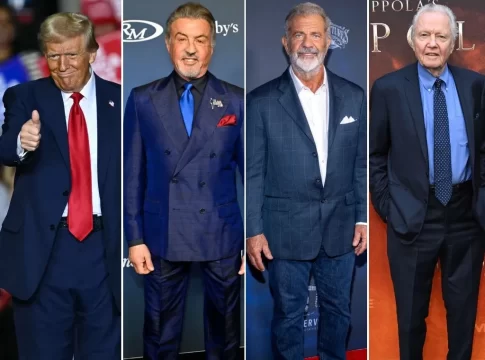In a surprising move, President-elect Donald Trump has named actors Mel Gibson, Jon Voight, and Sylvester Stallone as special ambassadors to rejuvenate Hollywood. As part of his bold vision, Trump aims to transform Hollywood into a thriving epicenter of filmmaking once more, reminiscent of its Golden Age.
Announcing the appointments on his social media platform, Truth Social, Trump declared his intention to make Hollywood “bigger, better, and stronger than ever before” after years of declining business due to international competition. “These iconic stars will be my eyes and ears in Hollywood,” Trump stated, underscoring his commitment to revitalizing the industry.
The decision to appoint these actors highlights Trump’s deep nostalgia for the 1980s and ’90s, eras when Gibson and Stallone were cinematic titans, and reflects his desire to restore Hollywood’s former glory. Speaking at a gala at Trump’s Mar-a-Lago estate, Stallone likened Trump to George Washington, emphasizing his belief in Trump’s transformative potential for America and Hollywood.
Mel Gibson expressed surprise at the appointment but vowed to contribute positively, while Jon Voight, a fervent Trump supporter, voiced optimism about Hollywood’s future under Trump’s guidance. “We have a President who wants to bring back the Golden Age, and with his support, we can achieve that,” Voight remarked.
Hollywood’s struggles have been significant in recent years, with production decreases exacerbated by the COVID-19 pandemic and industry strikes. According to ProdPro, overall U.S. film and television production fell by 26% from 2021. Meanwhile, FilmLA reported a 5.6% drop in productions in Los Angeles last year, the lowest since 2020.
Experts suggest that Hollywood’s decline highlights the need for strategic intervention. Dr. Sarah Kimball, a media analyst at UCLA, commented, “Revitalizing Hollywood requires not just star power but also substantial investment in infrastructure and innovation.” She believes that leveraging international markets while strengthening local production capabilities will be crucial.
Trump’s choice of ambassadors isn’t without controversy. Gibson, despite a history of antisemitic remarks, continues to work in the industry, directing high-profile projects like the upcoming Mark Wahlberg film “Flight Risk.” Meanwhile, Voight’s outspoken support for Trump has polarized opinions.
The appointments have garnered mixed reactions within Hollywood. While some industry insiders are hopeful about renewed focus on U.S.-based productions, others criticize the symbolic nature of the appointments. “It’s a flashy move, but we need real policy changes,” argues Steven Grant, a producer in Los Angeles.
As Hollywood navigates these turbulent times, Trump’s ambassadors face the challenge of implementing effective changes to restore the industry’s vitality. The spotlight is now on how Gibson, Voight, and Stallone will channel their influence to address Hollywood’s complex issues and help usher in a new era of cinematic success. As the industry awaits their initiatives, many are hopeful for a revival that honors Hollywood’s storied past while looking towards a dynamic future.


